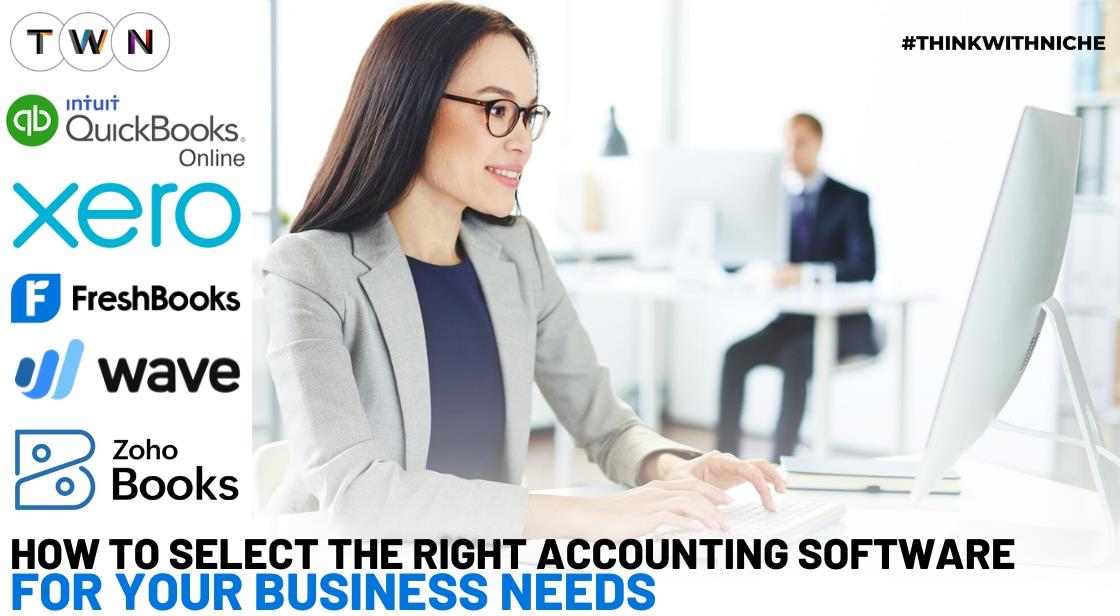How to Select the Right Accounting Software for Your Business Needs

Blog Post
In today’s fast-paced business environment, effective financial management is more crucial than ever. Accounting software has become an indispensable tool for businesses of all sizes, streamlining tasks such as invoicing, payroll, tax calculations, and expense tracking.
Whether you're managing a small startup or overseeing operations at a large corporation, choosing the right accounting software can greatly impact your efficiency, accuracy, and overall business growth.
Selecting the perfect accounting software involves more than just picking a product that fits your budget. It requires a comprehensive evaluation of your business's unique needs and the features that will best support your financial operations.
From understanding your specific requirements and exploring essential features to considering scalability, cost, and security, this guide will walk you through key factors to consider when choosing accounting software.
By making an informed decision, you can enhance your financial management processes, support your business’s growth, and ensure long-term success.
Tips for Selecting the Best Accounting Software for Your Business
Importance of accounting software for businesses of all sizes
In today’s fast-paced business environment, accurate and efficient financial management is crucial for companies of every size. Accounting software helps businesses manage their financial transactions, including invoicing, payroll, tax calculations, and expense tracking, in an organized and automated manner. Whether you’re running a small startup or a large corporation, having the right accounting tools can save time, reduce human error, and ensure compliance with financial regulations.
Streamlining Financial Management
Accounting software simplifies the complex task of handling financial data by automating key processes such as tracking expenses, managing invoices, and generating financial reports. These tools provide real-time insights into a company's financial health, enabling business owners and managers to make informed decisions. By reducing manual effort, businesses can allocate more resources to other critical areas, such as strategy development and customer service.
Improving Efficiency and Supporting Growth
By integrating accounting software into their operations, businesses can significantly improve efficiency. Features like automated billing, inventory tracking, and tax filing reduce the need for manual input, minimizing errors and speeding up processes. Additionally, as a business grows, its financial management needs become more complex. Scalable accounting software solutions can adapt to the evolving demands of a business, helping it handle increased transactions, more clients, and expanding operations seamlessly. In turn, this allows businesses to focus on growth rather than administrative tasks.
Understand Your Business Requirements
Before selecting accounting software, it is crucial to thoroughly assess your business's specific needs. Understanding these requirements will help you choose a solution that aligns with your financial management goals and ensures seamless operations.
Size of the Business
The size of your business directly influences your accounting software needs. A small business may require simple software with basic features, while a larger enterprise may need more robust solutions to handle complex financial transactions, reporting, and multi-user capabilities.
Industry-Specific Needs
Different industries have unique financial practices. For instance, a retail business may need software that tracks inventory, while a service-based company might prioritize billing and time tracking. Choose software that caters to your industry's specific needs, ensuring compliance with industry standards and regulations.
Number of Users
Consider how many people in your organization will need access to the software. Larger teams may require software with multi-user access, customizable permissions, and collaboration features. Ensure the software can accommodate the current and future user count without compromising security or efficiency.
Type of Financial Transactions
Evaluate the complexity and volume of your financial transactions. If your business handles international transactions, foreign currencies, or recurring billing, you will need software that supports these features. Understanding the nature of your financial transactions helps in selecting software with the right functionalities.
By identifying your business requirements upfront, you can choose accounting software that meets your specific needs, making financial management more efficient and effective.
Also Read: Top Free AI Tools to Boost Productivity and Creativity
Key Features to Look for in Accounting Software
When selecting accounting software for your business, it’s crucial to focus on the features that will streamline your financial operations and meet your specific requirements. Below are some essential features to consider.
Invoicing and Billing
Efficient invoicing and billing features are vital for businesses to manage cash flow. Look for software that allows you to create, send, and track invoices automatically. Automated payment reminders and customizable invoice templates can also improve your invoicing process, reducing errors and delays in payments.
Expense Tracking
Tracking expenses is crucial for understanding your business’s financial health. Accounting software should allow easy categorization of expenses, link them to specific projects or clients, and even capture receipts via mobile apps. Having real-time access to expenses ensures accurate budgeting and cost management.
Bank Reconciliation
Bank reconciliation helps to match your business’s financial records with your bank statements, ensuring accuracy. Choose software that automates the reconciliation process by importing bank transactions directly and flagging discrepancies, reducing manual errors and saving time.
Payroll Management
Managing payroll can be complex, especially for growing businesses. Look for accounting software that simplifies payroll processing, including automatic calculation of wages, tax deductions, and compliance with local labor laws. Integrated payroll management ensures timely and accurate salary disbursement for employees.
Tax Filing
Tax filing is an essential but time-consuming task for businesses. Accounting software should help you prepare and file taxes by tracking tax liabilities, generating tax reports, and ensuring compliance with current regulations. Automated tax features save time and reduce the risk of penalties for inaccurate filings.
Financial Reporting
Good financial reporting capabilities provide insights into your business's performance. Look for software that offers customizable reports like profit and loss statements, balance sheets, and cash flow analysis. These reports help you make informed decisions and stay on top of your finances.
Customization
Every business has unique financial needs. The ability to customize your accounting software ensures that it can adapt to your specific processes, workflows, and reporting requirements. This flexibility is key for aligning the software with your business goals.
Cloud-Based vs On-Premise Accounting Software
When choosing accounting software, businesses must decide between cloud-based and on-premise solutions. Each option comes with its own set of advantages and disadvantages. Below is a breakdown to help businesses make an informed choice.
Cloud-Based Accounting Software
Pros:
-
Accessibility: Cloud-based solutions allow users to access data anytime, anywhere, as long as there is an internet connection. This flexibility is ideal for businesses with remote teams or multiple locations.
-
Automatic Updates: Cloud providers handle software updates, ensuring that users always have the latest features and security patches without manual intervention.
-
Cost-Effective: Cloud-based software typically operates on a subscription-based model, eliminating the need for large upfront costs on hardware or IT infrastructure.
-
Scalability: Cloud platforms can easily accommodate business growth. As your business expands, you can upgrade your subscription without worrying about hardware limitations.
Cons:
-
Internet Dependency: Cloud-based software relies heavily on internet connectivity. If your connection is unstable or slow, it could affect performance and accessibility.
-
Security Concerns: While reputable cloud providers offer high-level security, businesses may still worry about sensitive financial data being stored offsite.
On-Premise Accounting Software
Pros:
-
Full Control: On-premise solutions give businesses full control over their data, as everything is stored on local servers. This can be reassuring for companies with strict security policies.
-
Customizability: On-premise software can be tailored to the specific needs of a business. This level of customization may not always be possible with cloud-based solutions.
Cons:
-
Higher Upfront Costs: On-premise systems often require significant upfront investment in hardware, IT infrastructure, and licensing.
-
Limited Accessibility: Since the software is installed on local servers, it can only be accessed on-site or through complex remote setups.
-
Maintenance and Updates: Businesses are responsible for managing updates, patches, and security, which requires dedicated IT support and resources.
Ease of Use and Integration
Importance of User-Friendly Software
Choosing accounting software that is user-friendly is crucial, especially for small businesses with limited accounting knowledge. User-friendly software helps in several ways:
-
Minimized Learning Curve: Intuitive interfaces and simple navigation reduce the time required to learn the software, allowing business owners and staff to start using it effectively without extensive training.
-
Efficiency Boost: Software that is easy to use enables users to perform accounting tasks quickly and accurately, improving overall efficiency and reducing the risk of errors.
-
Reduced Dependence on Specialists: With a user-friendly system, small businesses are less reliant on accounting specialists or external consultants for day-to-day operations, saving time and costs.
Significance of Seamless Integration
Seamless integration with other tools is another critical factor when selecting accounting software. Here’s why integration matters:
-
Enhanced Data Accuracy: Integration with Customer Relationship Management (CRM) systems ensures that customer and transaction data are synchronized, reducing the likelihood of discrepancies between sales and accounting records.
-
Streamlined Operations: Connecting accounting software with Enterprise Resource Planning (ERP) systems allows for a unified view of business operations, facilitating better decision-making and operational efficiency.
-
Simplified Financial Transactions: Integration with payment gateways simplifies the processing of transactions and reconciles payments directly within the accounting software, reducing manual entry and improving accuracy.
-
Automated Workflow: Seamless integration enables automated workflows across various business functions. For instance, integrating with inventory management systems can automatically update stock levels and adjust financial records accordingly.
By focusing on ease of use and integration capabilities, businesses can select accounting software that not only fits their current needs but also supports future growth and operational efficiency.
Scalability in Accounting Software
Understanding Scalability
Scalability in accounting software refers to its ability to handle growth without requiring significant changes or upgrades. As your business expands, whether through increased transactions, additional users, or expanded features, your accounting software should adapt to these changes seamlessly.
Future Expansion
When selecting accounting software, it's crucial to choose a solution that can accommodate future growth. Businesses often experience fluctuations in transaction volumes, customer numbers, or service offerings. Scalable software ensures that as these factors grow, the software continues to perform efficiently, avoiding disruptions in financial management.
Handling Increased Transactions
As your business scales, the volume of financial transactions typically increases. Scalable accounting software should efficiently process a higher number of transactions without slowing down or compromising accuracy. This capability is essential for maintaining smooth financial operations and timely reporting.
Supporting Additional Users
As businesses grow, the number of users accessing the accounting software often increases. Scalable software should support multiple users and provide features such as role-based permissions to ensure that team members have the appropriate access levels. This helps maintain security and ensures that all users can efficiently perform their tasks.
Customization and Upgrades
Scalable accounting software often comes with modular features or the ability to add new functionalities as needed. This flexibility allows businesses to customize the software to meet evolving requirements and integrate additional features, such as advanced reporting tools or industry-specific modules, as they expand.
Budget and Cost
Pricing Structures for Accounting Software
When choosing accounting software, businesses encounter different pricing models, which primarily include monthly subscriptions and one-time payments:
-
Monthly Subscription: This model requires businesses to pay a recurring fee, usually on a monthly basis. It often includes updates, customer support, and cloud storage. Subscription fees can vary based on the number of users, features, and level of support provided. This model is flexible and may be ideal for businesses with fluctuating needs or those looking to avoid large upfront costs.
-
One-Time Payment: This model involves a single, upfront payment for a perpetual license. Although the initial cost may be higher, it typically does not involve ongoing fees. However, businesses may need to pay extra for updates, support, and additional features. This option can be suitable for companies that prefer to manage their own updates and support or those with a more predictable budget.
Balancing Affordability with Features and Support
While cost is a critical factor, businesses should also consider the value provided by the software. Here’s how to strike a balance:
-
Evaluate Essential Features: Determine which features are crucial for your business operations and ensure that the chosen software meets these needs effectively. Investing in software that covers all necessary functionalities may save costs in the long run by reducing the need for additional tools or services.
-
Consider Long-Term Support: Good customer support and regular updates can prevent costly disruptions. Evaluate the level of support included in the pricing model and choose software that offers reliable assistance and regular updates to keep the system running smoothly.
Balancing affordability with comprehensive features and robust support ensures that businesses get the best value for their investment in accounting software.
Security and Data Protection
Importance of Robust Security Measures When selecting accounting software, security should be a top priority. Financial data is sensitive and crucial for business operations, making it essential to choose software with strong security features to protect against data breaches, fraud, and unauthorized access.
Encryption Encryption is a key component of data security. It involves converting data into a coded format that is unreadable without a decryption key. Ensure that the accounting software you choose uses robust encryption standards, both for data at rest (stored data) and data in transit (data being transmitted over networks). This helps safeguard sensitive information such as financial records, customer details, and transaction history.
Data Backups Regular data backups are vital to ensure that you do not lose critical information in case of system failures, cyberattacks, or accidental deletions. Look for accounting software that offers automatic and frequent backups, ideally with cloud storage options. This ensures that your data is securely stored and can be easily restored if needed.
User Permission Settings User permission settings control who can access and modify different types of data within the software. It’s important to select software that allows you to set granular permissions for various users based on their roles and responsibilities. This minimizes the risk of unauthorized access and ensures that only authorized personnel can view or alter sensitive financial information.
Customer Support and Training
Importance of Good Customer Support
For businesses new to accounting software, exceptional customer support is invaluable. Accounting software can be complex, and effective support can significantly ease the transition. Reliable customer service ensures that any issues or questions can be promptly addressed, minimizing downtime and reducing the risk of financial errors. Access to knowledgeable support staff helps businesses resolve problems quickly and provides peace of mind as they adapt to new software.
Availability of Resources
To facilitate a smooth learning curve, accounting software providers often offer a range of resources. These resources typically include:
-
Tutorials: Step-by-step guides that walk users through various functions of the software. Tutorials are especially useful for new users, helping them understand the software’s features and functionalities.
-
User Guides: Comprehensive manuals that provide detailed information on all aspects of the software. User guides are valuable for in-depth understanding and troubleshooting.
-
Webinars and Workshops: Live or recorded sessions that offer interactive training and demonstrations. These can be beneficial for real-time learning and getting answers to specific questions.
Responsive Customer Service
Effective customer service is crucial for addressing urgent issues and providing real-time support. Businesses should look for providers that offer multiple channels for support, such as phone, email, and live chat. Quick response times and resolution effectiveness are key factors in ensuring that users receive the help they need without unnecessary delays.
Best Accounting Software
QuickBooks Online: A widely-used accounting software suitable for small to medium-sized businesses, offering features like invoicing, expense tracking, and financial reporting.
Xero: Known for its user-friendly interface and strong collaboration features, Xero is ideal for small businesses, offering capabilities like invoicing, bank reconciliation, and reporting.
FreshBooks: Tailored for freelancers and small businesses, FreshBooks focuses on invoicing, expense tracking, and time tracking, making it easy to manage projects and client payments.
Wave: A free accounting software that’s great for small businesses and freelancers, Wave offers features like invoicing, accounting, and receipt scanning without monthly fees.
Zoho Books: Part of the Zoho suite, this software is designed for small to medium-sized businesses and includes features like invoicing, expense tracking, and bank reconciliation.
You May Like
EDITOR’S CHOICE












